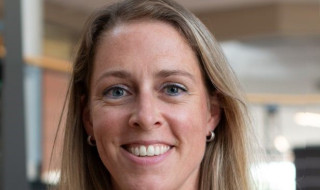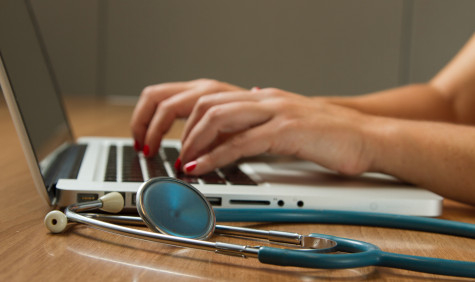There were still hardly any educational resources on topics such as ethics, healthcare technology and communication of measurement results with patients
Collection of digital educational resources for measurement in healthcare now available to all
Every medical and paramedical education gives attention to meaningful measurement. There was already a database for courses with measuring instruments, but not yet a place to share educational resources on this. That place now exists with ZIeZO measurement. What is available in this repository? And how did it come about?
In het kort
Wie: Esther Bols en Miriam van Ittersum
Functie: docenten/onderzoekers fysiotherapie
Organisaties: Zuyd Hogeschool en Hanzehogeschool Groningen
Uitdaging: er waren wel databases met meetinstrumenten, maar geen plek om leermaterialen over zinvol meten, ethiek en zorgtechnologie te delen tussen opleidingen en disciplines.
Oplossing: een publiek toegankelijke verzameling van meer dan 70 open digitale leermaterialen die interdisciplinair onderwijs over meten in de zorg ondersteunen en verdere kennisdeling stimuleren.
Esther Bols and Miriam van Ittersum are both lecturers/researchers in a physiotherapy programme; Bols at Zuyd University of Applied Sciences in Heerlen, Van Ittersum at Hanze University of Applied Sciences in Groningen. Both are involved in educational development and the theme of 'measurement in healthcare (with healthcare technology)'. Bols: "From an existing community around the database meetinstrumentenzorg.nl, various universities of applied sciences started working together in the field of measurement in care. That's how I got to know Miriam. Soon we had the idea that we could work together in many more areas than just keeping the database up and running."

How do you measure meaningfully?
Just then, SURF came up with the open and online education incentive scheme. "A wonderful opportunity," says Van Ittersum. "A lot is currently happening around the topic of measurement in healthcare, especially with the rise of healthcare technology. But you have to keep bridging the gap between care and technology. You can measure all kinds of things, but how do you use those measurement results in a meaningful way? We saw that there were quite a few educational resources on how to choose a measurement instrument in our courses. But that there was much less educational resources available on topics such as ethics, healthcare technology and communicating measurement results with patients."
21 participating courses
So the idea was born to develop a database of open digital educational resources accessible to all; freely accessible materials that you can use in your classes, and also adapt to your own needs if you wish. With the money that became available through the allocation of SURF's Open and Online Education grant application, Bols and Van Ittersum were able to set up a project group.
Through the cooperating universities of applied sciences, contacts were made with lecturers and lectors from as many as 21 different courses taught at seven universities of applied sciences. "So we immediately had a very broad project team with lecturers and lectors from all kinds of fields, from speech therapy to dietetics and from management in healthcare to oral care science," exclaims Bols enthusiastically. Van Ittersum adds: "We felt this diversity was important, because it is increasingly common in the field to work interdisciplinary, but the courses are still largely pigeonholed. If we want our students to also easily collaborate with other disciplines later in practice, they should already learn during their studies to start speaking a common language and to take measurements in such a way that other disciplines can also use those results."
If we want our students to collaborate easily with other disciplines later on in practice, they should already learn to start speaking a common language during their studies
Developing shared vision and vocabulary
The project team spent a lot of time on the first phase: developing a shared vision for education, framing the theme of meaningful measurement in healthcare practice and a shared vocabulary for the subject. Van Ittersum: "It took us quite a long time to do that, but it is an essential step if you are going to make educational resources openly available to everyone online."
Bols: "You have to make agreements about things like: how do we delineate the subject? How do we deal with quality? How do we ensure that all educational resources are GDPR compliant? Which main and subcategories do we make? For each sub-topic, we always made two lecturers mainly responsible."
The two made good use of the tools offered by SURF. "There are step-by-step plans and checklists that ensure you cover all the topics you have to deal with when developing a repository for open and online educational resources. That's nice, because you have to take into account an awful lot of aspects. Because of these checklists, we were sure we would not forget anything," says Bols.
They also made a clear breakdown into must haves and should haves. "So that we knew where to put our energy first." She was disappointed by how few practical examples there were. "We thought that many more lecturers and knowledge institutions would already be working with open and online educational resources where we could copy the art, but it turns out that we really are pioneers. In hindsight, it is nice that we did pioneering work."
Developing new educational resources
The theoretical part was not the most fun part of the project, Van Ittersum says honestly. Keeping people involved was also sometimes difficult in that phase. "But from the moment we started collecting educational resources, the energy started flowing again and it became more alive for everyone."
Dozens of different educational resources immediately came in that met the criteria to be included in the repository. Therefore, the team was also able to start analysing what was still missing fairly quickly. It turned out that there were three themes for which additional materials needed to be developed: ethics, measuring with care technology and communicating about the results with patients who are not so capable of translating the measurement result into what it means for them in practice. The project group is actively calling on the community to contribute to this and is also offering support.
ZIeZO measurement is a publicly accessible database of open digital educational resources
Build on what is already there
The ZIeZO repository now consists of more than 70 open and online educational resources in the field of meaningful measurement in healthcare practice. Van Ittersum: "We would very much like to start measuring how users experience and assess the use of the repository and the materials it contains, so that we can further develop it in a targeted way. We also want to call on lecturers and lectors to upload new materials themselves and, when developing new materials, to first look in the ZIeZO repository to see whether there are already materials they can build on. Because, of course, the whole idea of open educational resources is that you build on each other's work and don't have to reinvent the wheel yourself."
Questions?
If you have any questions about using the educational resources related to the theme Meaningful measurement, uploading newly developed educational resources or building on lessons developed by others, please consult the ZIeZO subject community homepage and specifically this fact sheet.
